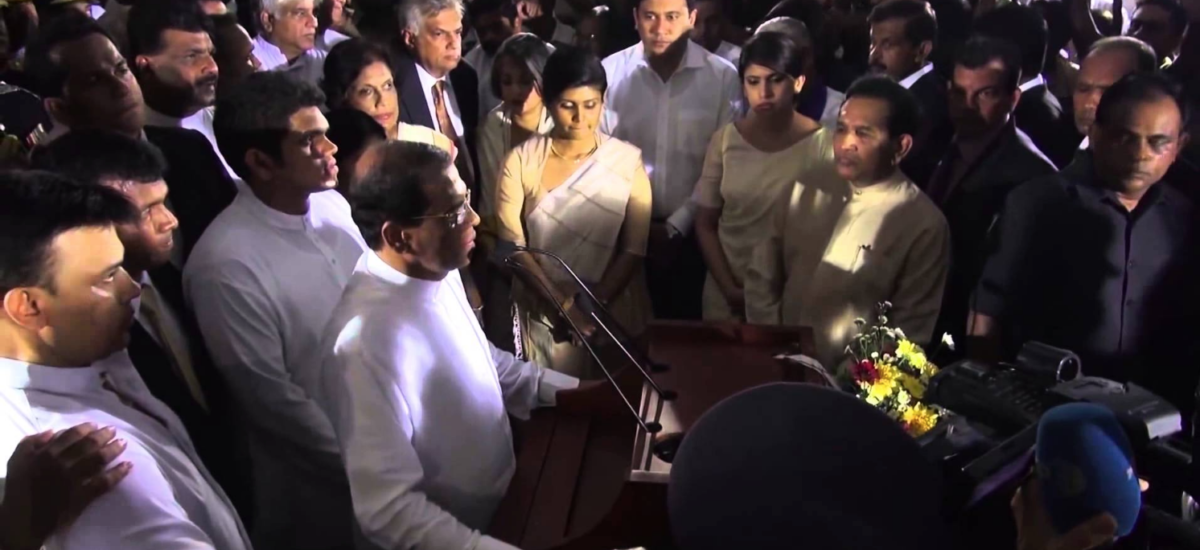Featured image courtesy PMDNews
The government has a superiority complex. Let me elaborate.
Within the last few weeks, the Government of Sri Lanka has managed to host tourism and promotional events and business interactions in Japan, Australia and South Africa, completed sessions at the Commonwealth Heads of Government Meeting (CHOGM), amended legislation that lift restrictions on Maternity leave, and renewed the United States Generalised System of Preference (GSP) trade concession. All in all, the Government of Sri Lanka has had victories – some significant, some not so significant – but all victories nonetheless.
The fault lies in the communication of these victories, and specifically, in the lack of communication vis-a-vis these victories. With the exception of the news on the renewal of the GSP concession that was brought to my attention by the Joint Opposition, the other headlines quoted above were not communicated – but discovered by myself on a quest for good news on a sombre Monday morning.
Governments have a role that is beyond administering a State for a stipulated number of years. Historically, governments have a responsibility in norm-setting and steering the social trajectory, by factoring in and adapting to the status quo. As Machiavellian as it sounds, we cannot deny the role Governments play in normalising stratagem. Surely a few Egyptians must have been irked when the Pharaoh’s Scribes’ knocked on their doors to collect a tax on cooking oil, but a few centuries later, regardless of how displeased we are with the specifics, all of us have come to terms with tax being an inevitable component of governance – and by extension, our lives.
The current government has a responsibility to recognise the changes in social dynamics, incorporate them in their system of governance and evolve alongside them if they intend to retain power, both in terms of the current good governance regime and in the long run as a functional institution. Getting citizens on board with their plan is a pivotal part of this journey – and not just leading up to the election.
To put it in colloquial terms, the current government needs to move with the times and speak the people’s lingo if they intend to stay in power in the short run, and contribute to the legitimacy of these political institutions in the long-run – as they are supposed to. That is, the government needs to shed the superiority complex of “people don’t understand governance”.
On social media, we can all contextualise our sub-par knowledge and come off as intellectual prodigies. The estimated 23% of the youth population coupled with a 92% literacy rate has many Sri Lankans comfortably thinking we know it all. Regardless of whether this holds true in reality, it is the government’s responsibility to recognise how we function and supply information to address our demand for the same, and to do away with the condescending rhetoric that the average citizen is incapable of grasping the nuances of tax policy. To put it simply, it is not your job to deem what we can or cannot grasp – it is your job to make sure we grasp what we should. As mentioned before, the government has a responsibility to set the tone, set the norm – and achieving that is only possible if these are communicated to average people. If the average Sri Lankan is incapable of understanding the complex nuances of tax policy, it’s best to figure out a way to convey the same through befitting means. In fact, it is partly the government’s responsibility to ensure that the average person understands the system of administration under which he/she functions.
The vacuum of information is dangerous because therein breeds fake-news. The current government’s inability to communicate with the average Sri Lankan has been brilliantly exploited by opposing views. I say brilliantly because the Opposition’s impeccable response rate, and the ruling coalition’s inexcusable oblivion has created an abundance of misinformation with unparalleled efficiency – possibly the biggest clog in the system that is the Government of Sri Lanka. For example, while the government issued one statement on the US GSP concession in an obscure corner of the internet that no one really picked up on, an MP sitting on the Opposition side of Parliament took it upon himself to bring a questionable rebuttal on the issue. As per usual, this resulted in another news-cycle where the opposition rebuttal – despite the content – took the spotlight away from the news itself.
Within the last few weeks, the victories that this Government has managed to achieve, has not been communicated adequately, in line with the larger vision for the country. The tragedy of this situation lies in the copious means at the Government’s disposal to communicate with their citizens. A Twitter account for each Ministry, a Facebook page for every Department, and yet days passed as we tried to figure out exactly what percentage of our fixed deposits and salaries were to be taxed.
The current Government needs to do away with the archaic notion of governance being too complex for average citizens. Part of your job is to un-complicate it, make yourself understood to the average people – the ones that put you there. Assumed intellectual superiority is not an excuse to sideline average citizens from the conversation – especially not in 2018, where instantaneous information has created an insatiable need for the same. If the current Government doesn’t figure out a method of doing so, it will only serve to hammer the nails in its own coffin.

